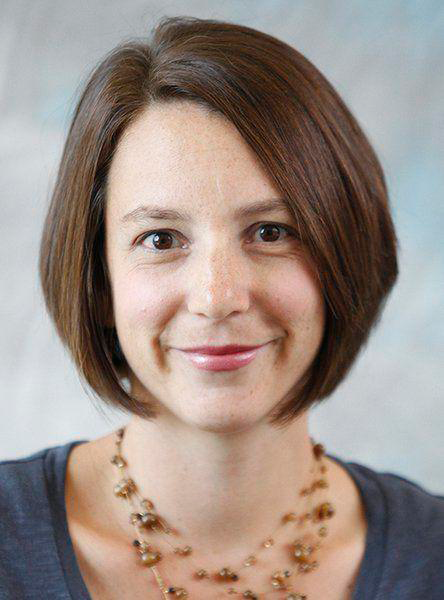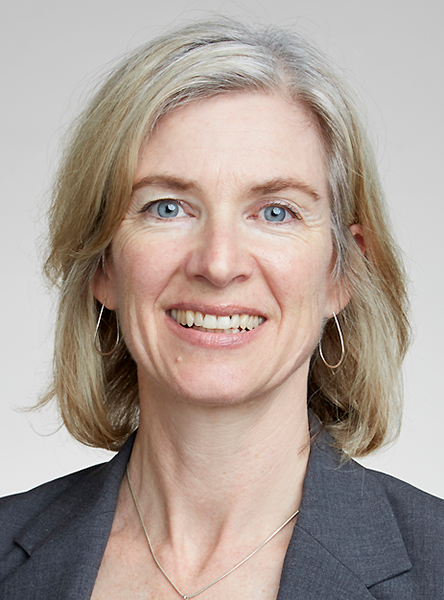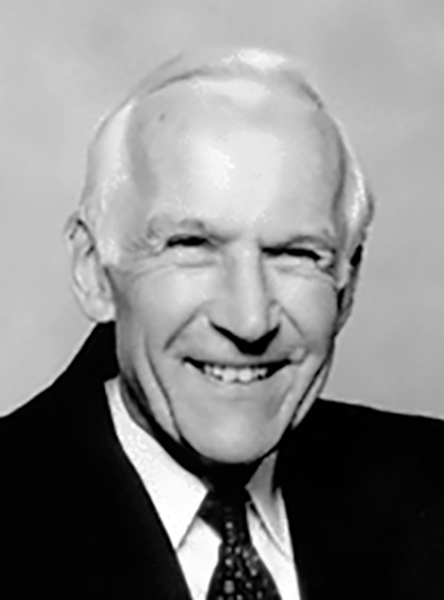Resendes receives award;
Doudna named fellow;
remembering Peters
Westminster College honors Resendes
Karen Resendes, an associate professor of biology at Westminster College in New Wilmington, Pennsylvania, has received the college’s 2020 Henderson Lectureship Award. The award recognizes excellence in scholarship among the faculty with a lectureship and a stipend for research.

Research in Resendes’ lab focuses on nuclear transport. As a postdoc, she described a second role for a centrosome protein that moonlights in protein export from the nucleus. With students, Resendes has followed up this protein’s activity and localization patterns, and her team also investigated the effects of chemotherapeutic compounds on nuclear transport.
Resendes co-directs Westminster’s center for undergraduate research and chairs the biology division of the Council on Undergraduate Research, a national organization promoting undergraduate research. She has published extensively on pedagogical research, working on course-based undergraduate research experiences and the effectiveness of clicker questions.
After earning a Ph.D. in molecular biology, cell biology and biochemistry at Brown University, Resendes taught at San Diego State University while conducting postdoctoral research at the University of California, San Diego. She joined the faculty at Westminster in 2009.
Doudna named Guggenheim fellow
Jennifer Doudna, the co-discoverer of the CRISPR-Cas9 genetic engineering technology, is among the 175 writers, scholars, artists and scientists to receive Guggenheim Fellowships in 2020.

Since it was established in 1925, the John Simon Guggenheim Memorial Foundation has granted more than $375 million in fellowships to over 18,000 individuals, who have enjoyed scores of international honors. Created by Senator Simon and Olga Guggenheim in memory of their son, the Guggenheim Fellowship program remains a significant source of support for artists, scholars in the humanities and social sciences, and scientific researchers.
Doudna is the Li Ka Shing chancellor’s chair in biomedical and health sciences and a professor of molecular and cell biology and professor of chemistry at the University of California, Berkeley, a Howard Hughes Medical Institute investigator, senior investigator at Gladstone Institutes and executive director of the Innovative Genomics Institute. Her lab studies how RNA molecules control the expression of genetic information.
In 2013, Doudna won the American Society for Biochemistry and Molecular Biology’s inaugural Mildred Cohn Award in Biological Chemistry. She recently shared the 2020 Wolf Prize in Medicine with Emanuelle Charpentier; the two determined the mechanism of RNA-guided bacterial adaptive immunity by the CRISPR–Cas9 system, enabling them to harness the system for efficient genome engineering in animals and plants.
In memoriam: Theodore Peters
Theodore Peters, a research biochemist who held leadership roles in the American Association for Clinical Chemistry and wrote the book “All about albumin,” died March 19. He was 97.

As the son of a country doctor in Chambersburg, Pennsylvania, Peters became fascinated with chemistry watching his father perform Fehling tests for urinary sugar and hanging around the back room of a nearby apothecary, according to an AACC biography. He graduated summa cum laude in chemical engineering from Lehigh University, then served as a submarine radar officer during World War II. He earned a Ph.D. in biological chemistry from Harvard University, held faculty positions at Harvard Medical School and at the University of Pennsylvania Medical School, and served another two years in the Navy during the Korean War.
In 1955, Peters began his career as a research biochemist at the Mary Imogene Bassett Hospital in Cooperstown, New York, where he remained until he retired in 1988. As Bassett’s only chemist in 1955, he managed the hospital’s clinical chemistry laboratory. His research centered on plasma proteins, particularly serum albumin. He defined the intracellular pathway by which newly formed albumin reaches the circulation, and his research group studied the structure of albumin, including the important sites that transport long-chain fatty acids and bilirubin.
As a founder of the Upstate New York section of AACC, Peters served as the section’s chairman from 1963 to 1964 and later chaired the AACC standards committee. From 1970 to 1984, he was on the board of editors for the journal Clinical Chemistry. He served on multiple AACC committees and received several awards from the association before and after being named president in 1988.
Peters played trumpet and drums for 60 years with the Cooperstown Community Band. He played tennis and squash and was an avid jogger, fly fisherman and outdoorsman. He and his wife, Maggie, visited nearly 20 countries on six continents, missing only Antarctica, and all 50 states.
Maggie Peters died in 2013. Peters is survived by his four children, Theodore, James, Melissa Barry and William, and their spouses; seven grandchildren; and four great-grandchildren.
Enjoy reading ASBMB Today?
Become a member to receive the print edition four times a year and the digital edition monthly.
Learn moreGet the latest from ASBMB Today
Enter your email address, and we’ll send you a weekly email with recent articles, interviews and more.
Latest in People
People highlights or most popular articles

From humble beginnings to unlocking lysosomal secrets
Monther Abu–Remaileh will receive the ASBMB’s 2026 Walter A. Shaw Young Investigator Award in Lipid Research at the ASBMB Annual Meeting, March 7-10 in Washington, D.C.

Chemistry meets biology to thwart parasites
Margaret Phillips will receive the Alice and C. C. Wang Award in Molecular Parasitology at the ASBMB Annual Meeting, March 7-10 in Washington, D.C.

ASBMB announces 2026 JBC/Tabor awardees
The seven awardees are first authors of outstanding papers published in 2025 in the Journal of Biological Chemistry.

Decoding how bacteria flip host’s molecular switches
Kim Orth will receive the Earl and Thressa Stadtman Distinguished Scientists Award at the ASBMB Annual Meeting, March 7–10, just outside of Washington, D.C.

Thiam elected to EMBO
He was recognized during the EMBO Members’ Meeting in Heidelberg, Germany, in October.

The timekeepers of proteostasis
Learn about the cover of the winter 2026 ASBMB Today issue, illustrated by ASBMB member Megan Mitchem.
